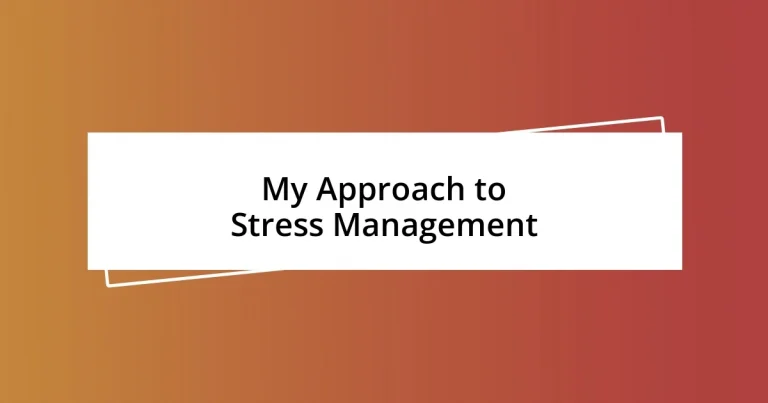Key takeaways:
- Understanding stress involves recognizing emotional and physical impacts, which can affect relationships and health.
- Identifying personal triggers — such as social situations and multitasking — is essential for effective stress management.
- Building a supportive social network enhances resilience, allowing for shared experiences and accountability in overcoming stress.
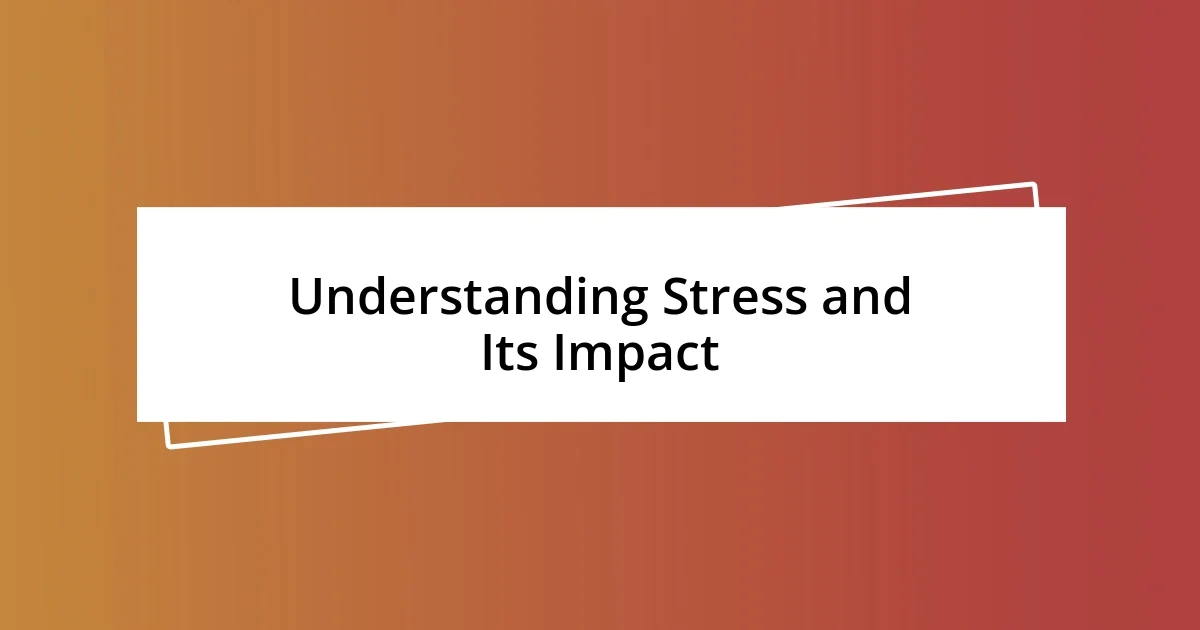
Understanding Stress and Its Impact
Stress is an experience we all encounter, often triggered by various factors like work deadlines or personal challenges. I remember a time when I felt utterly overwhelmed by the demands of a project at work—my chest felt tight, and I could hardly concentrate. Have you ever felt that knot in your stomach when life gets too hectic? It’s a universal experience, one that can manifest both emotionally and physically.
The impact of stress stretches far beyond the immediate sense of urgency. It can seep into our relationships and hinder our productivity. I once found myself irritable with friends and family, missing out on meaningful connections because my mind was too preoccupied. Have you noticed how stress can cloud your ability to enjoy the simple moments in life? It’s crucial to recognize these signs and understand how stress can warp our perspective.
Moreover, prolonged stress can have serious implications for our health. I learned this firsthand when I experienced persistent headaches and fatigue, leading me to seek professional help. It made me wonder, what cost are we paying for our busy lives? Understanding stress is not just about recognizing feelings; it’s about appreciating its varied influences on our holistic well-being.
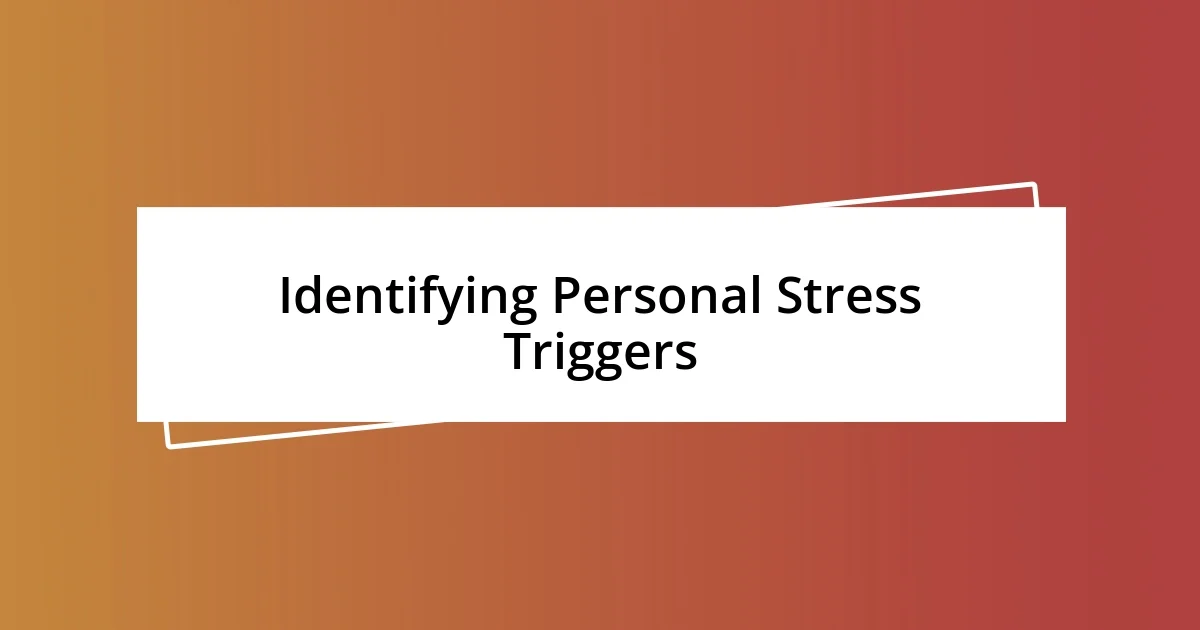
Identifying Personal Stress Triggers
Recognizing your personal stress triggers is a pivotal step in managing stress effectively. I recall a situation where I discovered that large social gatherings were particularly taxing for me. It wasn’t just the crowds; it was the pressure to engage and maintain a conversation that drained my energy. Have you ever pinpointed specific environments or situations that seem to sap your motivation? Identifying these triggers can help you avoid or better prepare for them.
Another aspect I found fascinating is how our daily routines can mask stressors. For example, I used to think I was simply busy at work, but I later realized that constant multitasking was a major contributor to my stress. This awareness helped me reassess my workflow, allowing me to prioritize tasks better. Have you noticed how certain habits can lead to unnecessary pressure? It’s essential to reflect on our routines and identify what truly causes us to feel overwhelmed.
My experience has shown me that stress triggers can sometimes be deeply rooted in our past experiences. For instance, I uncovered that my fear of public speaking stemmed from an embarrassing moment in high school. Recognizing this allowed me to work through that anxiety. Can you think of situations in your past that influence your current stress responses? Understanding these connections not only sheds light on our stress triggers but also opens the door to personal growth.
| Common Stress Triggers | Personal Experience |
|---|---|
| Social Gatherings | Felt overwhelmed in large crowds due to engagement pressure. |
| Multitasking at Work | Realized constant task-switching led to increased stress levels. |
| Past Experiences | Uncovered fears linked to past embarrassing moments. |
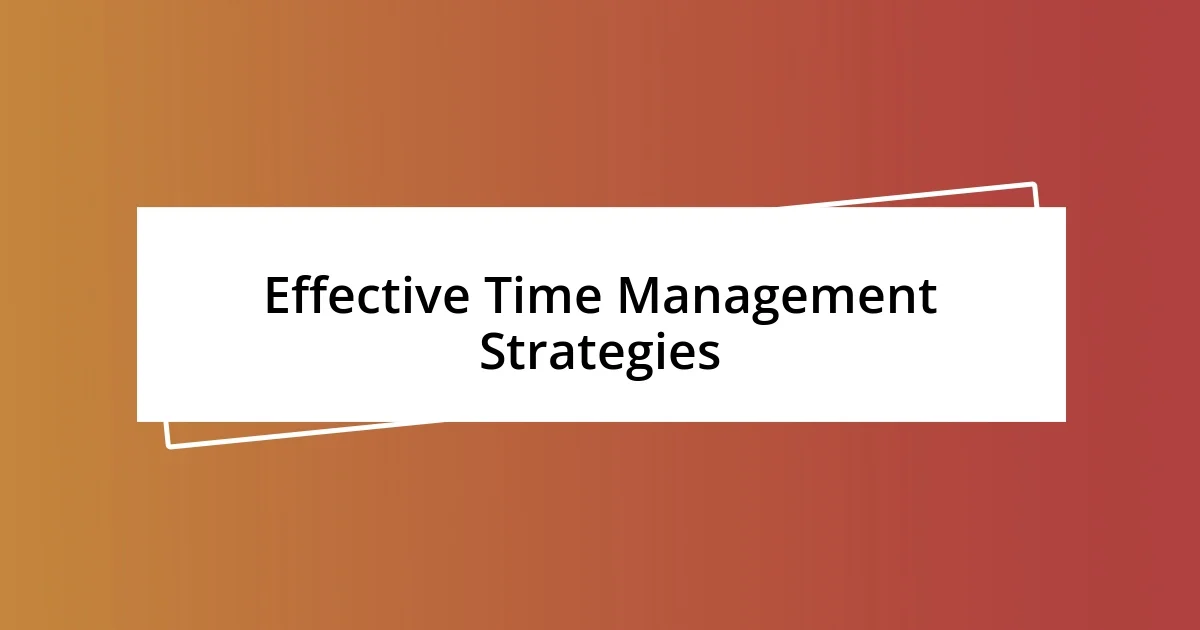
Effective Time Management Strategies
Effective time management is crucial for reducing stress and maintaining a balanced life. I’ve found that one of the best strategies is to prioritize tasks using the Eisenhower Matrix, which categorizes them into four quadrants: urgent and important, important but not urgent, urgent but not important, and neither urgent nor important. This method helps clarify what truly matters, letting me focus on high-impact activities rather than getting lost in a sea of to-dos. Have you ever felt the weight lift when you realize you can delegate or eliminate tasks that don’t serve your goals?
Here are some practical time management strategies you might find helpful:
- Set Clear Goals: Establish specific, measurable, attainable, relevant, and time-bound (SMART) goals to guide your efforts.
- Create a Daily Schedule: Allocate specific time slots for each task, treating them as appointments you cannot miss.
- Limit Distractions: Identify what pulls your attention away from your work—be it social media, phone notifications, or background noise—and find ways to minimize these interruptions.
- Use Time Blocks: Dedicate chunks of time for focused work sessions, followed by short breaks to recharge. I personally love the Pomodoro Technique, where I work for 25 minutes and then take a 5-minute break; it keeps me refreshed and productive.
- Review and Reflect: At the end of each week, take a moment to assess what worked, what didn’t, and adjust your approach moving forward. This reflection helps me feel more in control and less stressed about upcoming tasks.
In reflecting on my own journey, I’ve learned that time management isn’t just about creating a perfectly structured day; it’s about finding what works best for me and being flexible enough to adapt as my needs change. Do you remember the last time you felt overwhelmed by your schedule? By strategically managing my time, I’ve not only reduced stress but also carved out moments to enjoy life more fully.
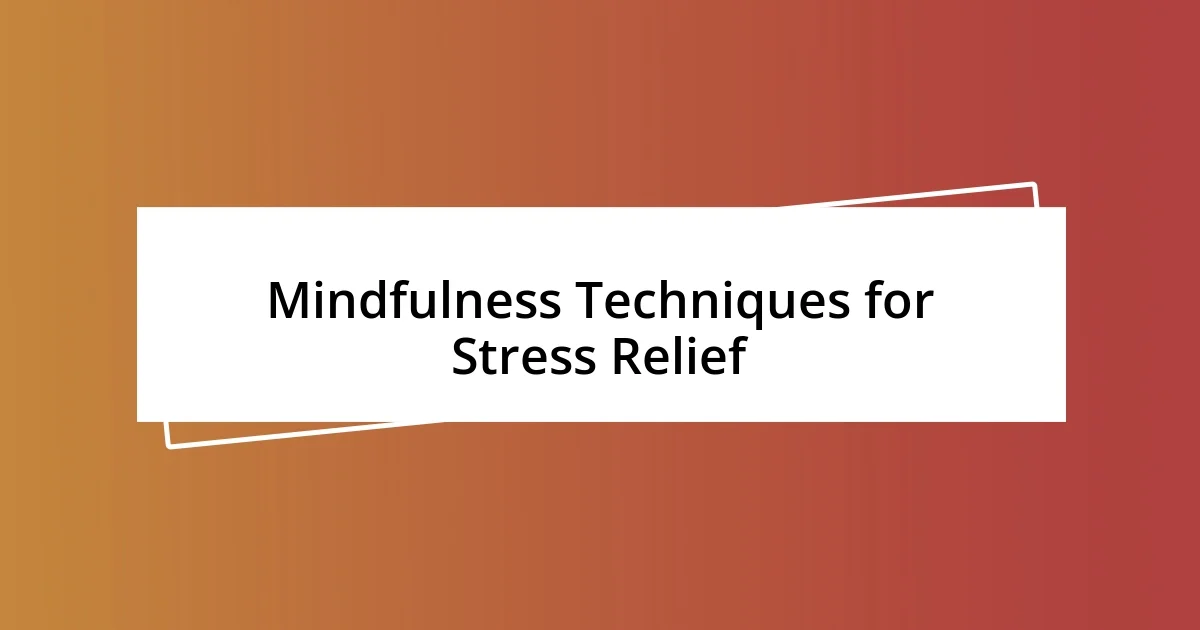
Mindfulness Techniques for Stress Relief
Mindfulness techniques can profoundly change the way we handle daily stress. In my experience, practicing deep breathing exercises has been a game changer. Whenever I feel the pressure building, I take a moment to focus on my breath—slowly inhaling through my nose and exhaling through my mouth. It sounds simple, but that intentional focus on breathing calms my mind and body, making the chaos feel a little more manageable. Have you tried using your breath as an anchor during stressful moments?
Another technique I’ve found incredibly effective is body scanning, a practice that encourages awareness of physical sensations. I remember lying on the floor after a particularly taxing day, mentally scanning from my toes to the top of my head. Noticing tension in my shoulders and consciously releasing it was like shedding a heavy blanket. This practice not only helps me unwind but also fosters a deeper connection with my body, which feels so important in a world that encourages ignoring our physical cues. Have you ever paused to check in with what your body is telling you?
Finally, I can’t overlook the power of mindful meditation—which, admittedly, took me time to embrace. At first, I would fidget or get lost in my thoughts, but gradually, I learned to be kinder to myself during those sessions. Now, I find that even just a few minutes of sitting quietly with my thoughts can establish a sense of peace that permeates my day. There’s something so grounding about allowing oneself to just be, don’t you think? It’s amazing how these techniques can transform stress from an overwhelming force into something we can handle with intention and grace.
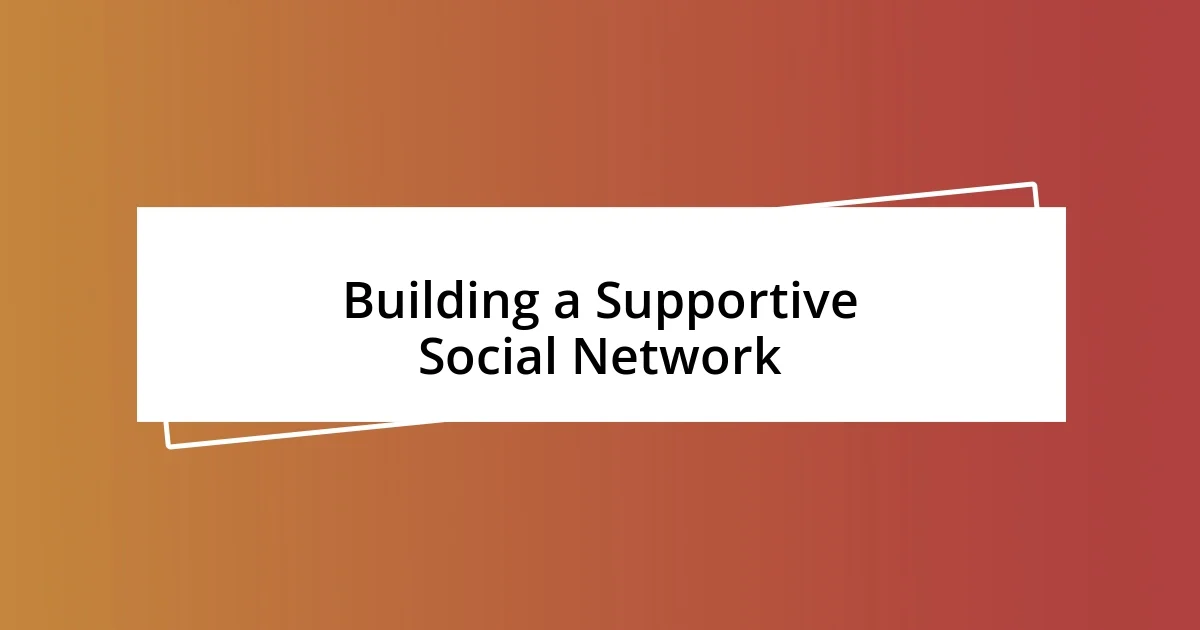
Building a Supportive Social Network
Building a supportive social network can be a game changer when it comes to managing stress. I vividly remember the times I leaned on my friends during particularly overwhelming phases; those moments of sharing fears and concerns felt like lifting a weight off my shoulders. Have you ever had a conversation where just expressing your worries made them feel less daunting? The solace found in a listening ear is often underrated.
Moreover, the quality of connections matters just as much as the quantity. I’ve found that surrounding myself with positive, encouraging people who uplift me not only brightens my day but also enhances my resilience when challenges arise. I recall a friend who always seems to offer the right perspective at the right time. Just the other week, when I was wrestling with a tough decision, her insights shifted my entire outlook. How do the people in your life influence how you handle stress?
To actively build and maintain these supportive relationships, I make it a point to invest time into my connections. Whether it’s a simple catch-up over coffee or sending a quick text to check in, consistency fosters deeper bonds. I cherish the moments spent with my group of friends; not only do we share laughs, but we also provide accountability and support for each other’s goals. Have you considered how these small actions could enrich your own social network? The power of connection can transform stress into a shared experience rather than a solitary burden.












